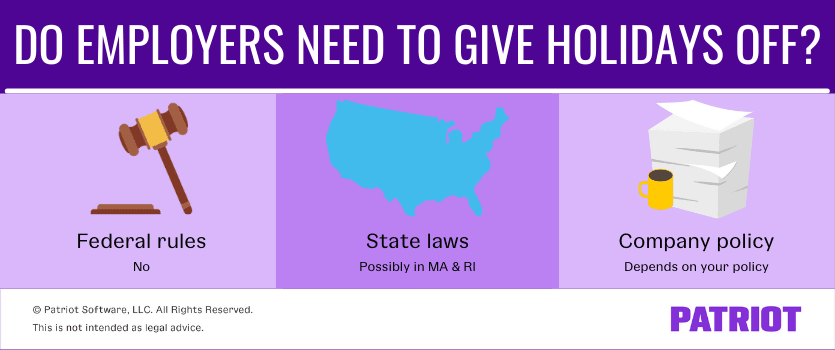Minimum wage law. Overtime pay. Paid sick leave laws by state. The list goes on and on. Between federal and state workplace laws, there’s a lot that employers need to keep track of. But, what about holidays? Are employers required to give holidays off to employees?
If you’re an employer, you need to know the answer. That answer impacts everything from your company policy to your business hours.
Are employers required to give holidays off?
There are over 10 federal legal holidays, including Christmas Day, Memorial Day, and Juneteenth. The question is: Are federal holidays mandatory for all businesses and employees?
To answer the question more fully, look to federal and state rules on the subject. Then, create a company policy that’s compliant—and stick to it.

1. Understand federal rules
So, who gets federal holidays off? Federal businesses generally observe federal legal holidays, which include:
- New Year’s Day
- Martin Luther King Jr. Day
- President’s Day
- Memorial Day
- Juneteenth
- Independence Day
- Labor Day
- Columbus Day
- Veterans Day
- Thanksgiving Day
- Christmas Day
But, what about private employers? What do they need to do about federal legal holidays?
The Fair Labor Standards Act (FLSA) is the big federal law that establishes workplace standards like minimum wage and overtime. So, does the FLSA require private employers to give employees paid time off for holidays?
Nope. The FLSA does not require that employers pay employees for time not worked, such as holidays.
There’s also no federal law requiring private employers to give employees any holidays off. And, there is no federal law requiring private employers to give employees a premium pay rate (e.g., time and a half or double-time) just for working on a holiday.
Long story short: Private employers do not have to give employees time off on holidays or provide premium pay to those who work under federal law.
2. Check your state laws
Some states have stricter or additional workplace laws than what the FLSA requires. This includes state:
- Minimum wage laws
- Overtime rules
- Paid sick leave laws
- Paid family leave laws
- Final paycheck laws
- PTO payout laws
- Rest and meal break laws
So, are there state holiday pay rules? For the most part, no. Like the FLSA, most states do not require private employers to do anything special on holidays, such as give employees paid time off, premium pay, or unpaid time off.
However, there are two states—Massachusetts and Rhode Island—that have holiday rules that impact private employers.
Massachusetts
Massachusetts’ holiday rules are known as “Blue Laws.” The Massachusetts Blue Laws determine which businesses can legally operate on state legal holidays (and Sundays) and whether employers must give employees premium pay.
If you’re an employer in Massachusetts, you may be required to obtain a permit to operate on specified legal holidays. State requirements depend on what kind of establishment you own:
Retail
- Unrestricted holidays: The state does not require a permit, premium pay, or voluntariness of employment.
- Martin Luther King Day, President’s Day, Evacuation Day, Patriots’ Day, and Bunker Hill Day
- Partially restricted holidays: You do not need a permit, but you can’t force employees to work. You may also need to give employees premium pay for working a holiday.
- New Year’s Day, Memorial Day, Juneteenth Independence Day, Independence Day, Labor Day, Columbus Day after noon, and Veterans Day after 1 p.m.
- Restricted holidays: You must obtain a permit. And if you obtain a permit, premium pay and voluntariness of employment requirements may apply.
- Columbus Day before noon, Veterans Day before 1 p.m., Thanksgiving Day, and Christmas Day
Non-retail
- Unrestricted holidays: Most non-retail businesses can operate without a permit or other state restrictions.
- New Year’s Day, Martin Luther King Day, President’s Day, Evacuation Day, Patriots’ Day, Bunker Hill Day, Juneteenth Independence Day, Columbus Day after noon, Veterans Day after 1 p.m.
- Restricted holidays: Most non-retail businesses cannot operate on all other legal holidays unless they meet an exemption.
- Memorial Day, Independence Day, Labor Day, Columbus Day before noon, Veterans Day before 1 p.m., Thanksgiving Day, and Christmas Day
Manufacturer
- Unrestricted holidays: The state does not require a permit, premium pay, or voluntariness of employment.
- New Year’s Day, Martin Luther King Day, President’s Day, Evacuation Day, Patriots’ Day, Bunker Hill Day, Juneteenth Independence Day, Columbus Day after noon, and Veterans Day after 1 p.m.
- Restricted holidays: Generally, you must obtain a permit. And if you do obtain a permit, you cannot require employees to work these days unless the work is absolutely necessary and can lawfully be performed on Sunday.
- Memorial Day, Independence Day, Labor Day, Columbus Day before noon, Veterans Day before 1 p.m., Thanksgiving Day, and Christmas Day
Check out the Massachusetts Blue Laws for more information, including premium rates and requirements.
Rhode Island
Rhode Island requires private employers to pay employees a premium rate of time and a half on state legal holidays for hours worked. And, employees must be able to refuse work on holidays (unless they are employed by a manufacturer that operates seven days a week).
Rhode Island legal holidays include:
- New Year’s Day
- Memorial Day
- Independence Day
- Victory Day
- Labor Day
- Columbus Day
- Veterans Day
- Thanksgiving Day
- Christmas Day
For more information, check out A Guide to Wage and Workplace Laws in Rhode Island.
3. Your company policy
After checking in on your federal and state requirements, create a compliant company policy that answers Is holiday pay mandatory?
Determine how your business handles holidays. For example, you might:
- Require employees work as normal on holidays
- Give employees the day off (paid or unpaid)
- Give employees premium pay (e.g., time and a half or double pay)
Once you create your policy, stick to it.
So, do employers have to pay holiday pay? The bottom line
In most cases, private employers aren’t obligated to do anything special when it comes to employees and holidays. But sometimes, whether you have to give employees time off or premium pay on holidays depends on some factors.
Ask yourself:
- Am I a private employer? If you’re a private employer, federal law does not require you to give employees holiday off or premium pay.
- Is my business in Massachusetts or Rhode Island? If you’re a private employer and your business is in Massachusetts or Rhode Island, you may need to give employees paid time off on holidays, premium pay on holidays, or the right to refuse work on holidays.
- What does my company policy say? After creating a company policy on holidays, follow it. If you say employees have paid or unpaid time off on holidays, or if you say employees receive premium pay on holidays, stick to it.




